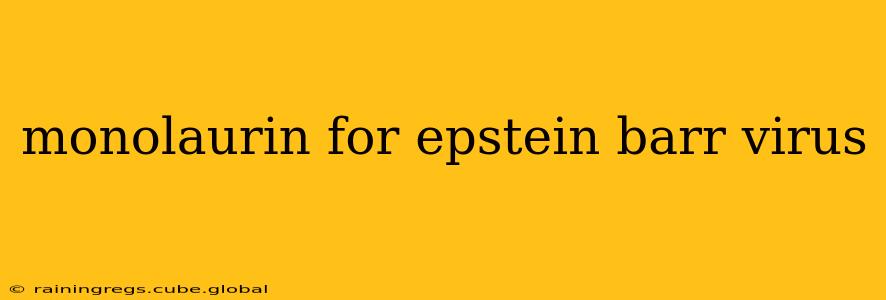Epstein-Barr virus (EBV), a common herpes virus, infects the majority of adults worldwide. While usually asymptomatic, EBV can cause infectious mononucleosis ("mono") and, in rare cases, is linked to more serious conditions like certain cancers. This has led many to explore alternative therapies, including monolaurin, a monoglyceride derived from lauric acid found in coconut oil. This article explores the current research on monolaurin's potential role in combating EBV. We'll address common questions and clarify the current scientific understanding.
What is Monolaurin?
Monolaurin is a saturated fatty acid ester that's a byproduct of the digestion of lauric acid, primarily found in coconut oil. Lauric acid itself possesses antimicrobial properties, and some studies suggest monolaurin amplifies these effects. It's thought to work by disrupting the lipid membranes of viruses, effectively inactivating them.
Does Monolaurin Kill Epstein-Barr Virus?
This is a crucial question, and the short answer is: more research is needed. While in vitro studies (lab tests) have shown monolaurin to exhibit antiviral activity against some viruses, there's a significant lack of robust clinical trials demonstrating its efficacy against EBV in humans. Existing research primarily focuses on its effects against other viruses and bacteria. Therefore, claiming monolaurin definitively kills EBV would be misleading.
Can Monolaurin Help with Epstein-Barr Virus Symptoms?
While direct antiviral effects against EBV remain unproven, some proponents suggest monolaurin might help manage symptoms associated with EBV reactivation. These symptoms can include fatigue, muscle aches, and brain fog. However, this is largely anecdotal, and further studies are required to confirm any such benefits. Any perceived improvement could be due to other factors or the natural course of the illness.
What are the side effects of taking monolaurin?
Generally, monolaurin is considered safe when taken in recommended dosages. However, some individuals may experience mild gastrointestinal upset, such as diarrhea or nausea, especially with higher doses. As with any supplement, consulting a healthcare professional before use is recommended, especially if you have pre-existing health conditions or are taking other medications.
Is monolaurin a cure for Epstein-Barr virus?
No, currently there is no known cure for Epstein-Barr virus. While some studies suggest monolaurin may have antiviral properties, it has not been proven to cure EBV. It's crucial to rely on evidence-based treatments and consult with healthcare professionals for diagnosis and treatment of EBV-related illnesses.
How effective is monolaurin against viruses?
Monolaurin's effectiveness against viruses varies greatly depending on the specific virus and the research methodology employed. In vitro studies often show promising results, but translating these findings to human clinical trials is crucial and often challenging. While monolaurin shows antiviral activity in some studies, conclusive evidence supporting its widespread antiviral efficacy is still lacking.
What are the best ways to treat Epstein-Barr virus?
The treatment for EBV largely depends on the symptoms and the stage of the infection. For most individuals, EBV infection is self-limiting and requires only symptomatic management (managing symptoms like fatigue and fever). In cases of infectious mononucleosis, rest, fluids, and pain relievers are often recommended. Severe cases or complications might require antiviral medications or other interventions under a physician's care. Always consult a healthcare professional for diagnosis and treatment.
Are there any natural ways to support the immune system during an EBV infection?
Maintaining a healthy lifestyle can be beneficial in supporting the immune system's response to viral infections like EBV. This includes consuming a balanced diet rich in fruits, vegetables, and whole grains, prioritizing sufficient sleep, managing stress levels effectively, and engaging in regular exercise. These lifestyle choices can indirectly support the body's natural immune response, but they are not a replacement for medical treatment if needed.
Disclaimer: This information is for educational purposes only and should not be considered medical advice. Always consult a healthcare professional before starting any new supplement or treatment, especially if you have pre-existing health conditions or are taking other medications. The information presented here reflects the current scientific understanding and may change as new research becomes available.
